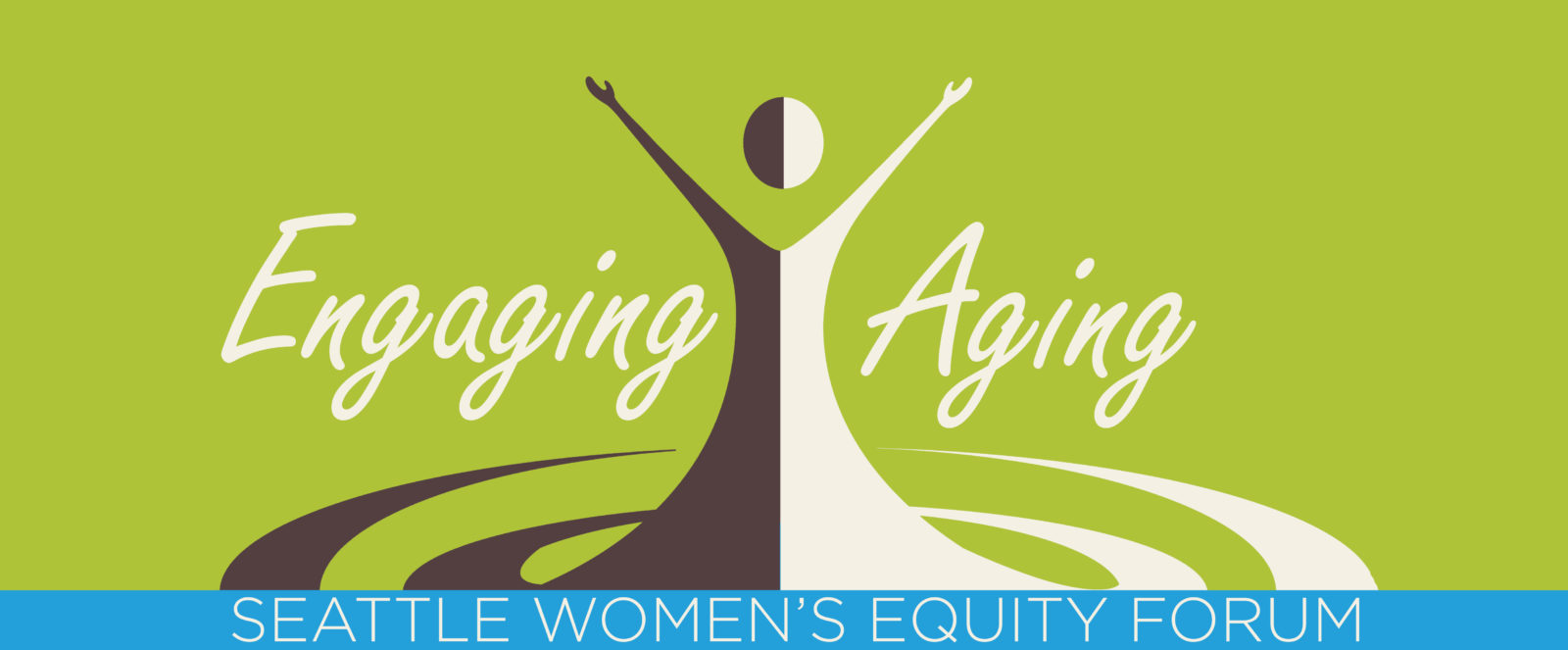“Engaging Aging” Forum to Focus on Women, Equity, and Optimal Aging

What do you know about women and aging? Are there differences between how older men and older women live? Age Friendly Seattle—a new City of Seattle initiative to make Seattle a great place to grow up AND grow old—will hold a forum this fall where you can explore those questions and more.
We already know the following:
- Older women outnumber older men, and are more likely to be widowed and to live alone.
- On average, women earn between 77 percent and 83 percent of what men earn for the same job. This gap affects retirement income. The gaps impact women of color, LGBTQ women, and single women most.
- Caregivers typically experience lost wages, reduced retirement funds, and lower Social Security benefits. Women experience greater reductions than men. Low-income women are particularly impacted by caregiving career interruptions.
- A full 25 percent of women age 60+ in King County live in or near poverty, compared to 19 percent of men.
Why, and what can we do about it? Come to “Engaging Aging,” a forum focused on women and optimal aging, on Monday, November 6, from 3–8 p.m. at Seattle City Hall (600 4th Avenue, Seattle). The forum opens at 3 p.m. with a resource fair. At 4 p.m., the program starts.

LueRachelle Brim-Atkins
The forum’s keynote speaker is LueRachelle Brim-Atkins, The Diversity Collaborative, who will address “The Triple Whammy: Ageism, Racism & Sexism.” Eight lightning talks will set the stage for roundtable discussions by all participants. These will include (tentative titles):
- Keep Moving, Stay Connected, Live Well with Memory Loss (Marigrace Becker, UW Memory and Brain Wellness Center)
- Finding Employment When You’re Female, Fabulous, and Fifty-plus (Lynda Hunter, Aging and Disability Services)
- Anti-displacement Policies that Could Help More Women Age in Place (Sharonn Meeks, Washington State Housing Finance Commission)
- Caregiving: So Rewarding … and Oh, So Stressful (Dolores Rossman, Rossman-Guerrero y Asociados)
- Health Issues on the Horizon: What Women Need to Know, What Cities Need to Do (Patty Hayes, Public Health—Seattle & King County)
- You’re Not Alone: Avoiding Loneliness in Later Life (Anu Orebiy, Catholic Community Services of Western Washington)
- Preventing Gender Based Violence and Elder Abuse
- Women and Economic Insecurity: Advocacy and Policy Solutions
Speakers will address strategies that Age Friendly Seattle and City leaders can consider implementing to support optimal aging for women in Seattle. Strategies could include new policies (laws), programs (direct services and/or funding), outreach (increasing access) and/or advocacy.
The audience will discuss the presentations and indicate those ideas that merit the most attention. Age Friendly Seattle will publish comments and ideas from the forum. We hope the forum will generate specific actions that the City can implement in the four years to benefit women and optimal aging.
Co-sponsors include AARP Washington, Aging and Disability Services, African American Elders Program, Arcora Foundation of Delta Dental of Washington, Asian Counseling and Referral Service, Chinese Information and Service Center, City of Seattle, Crone of Puget Sound, El Centro de la Raza, Fedelta Home Care, Generations Aging with Pride, Healthy Aging Partnership, Home Instead Senior Care, King County Department of Community and Human Services, King County Mobility Coalition, King County Women’s Advisory Board, Korean Women’s Association, Mayor’s Council on African American Elders, National Asian Pacific Center on Aging, Northwest Center for Creative Aging, Public Health—Seattle & King County, Puget Sound Advocates for Retirement Action, Seattle Human Services Department, Seattle Parks and Recreation, Seattle Women’s Commission, Sound Generations, and Women’s Funding Alliance.
The event is free to attend but pre-registration is required. Visit www.surveymonkey.com/r/EngagingAging or call 206-386-1521.
For more information about the forum, visit www.seattle.gov/agefriendly. Read the About section to learn about “The 8 Domains of Livability”—transportation, housing, outdoor spaces and buildings, social participation, respect and social inclusion, civic participation and employment, community and health services, and communication and information. Age Friendly Seattle will propose specific actions in each of those domains in its action plan for 2018–2021.
Questions? E-mail agefriendly@seattle.gov. For ongoing information about Age Friendly Seattle, send a message to AGEFRIENDLY-subscribe-request@talk2.seattle.gov to join the listserv.
Contributor Irene Stewart, the Age Friendly Seattle project manager, has worked in aging network programs since 2004 and for the City of Seattle since 1999. To learn more about Age Friendly Seattle, e-mail agefriendly@seattle.gov or visit www.seattle.gov/agefriendly.
This article originally appeared in AgeWise King County (October 2017)
![Aging & Disability Services for Seattle & King County [logo]](https://www.agingkingcounty.org/wp-content/themes/sads/images/seattle-ads-logo.png)